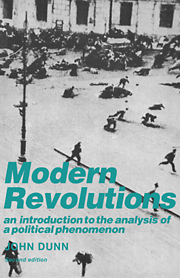Book contents
- Frontmatter
- Contents
- Preface to the first edition
- Introduction to the second edition
- Introduction: the ideological dilemmas of moden revolution and its analysts
- 1 Russia
- 2 Mexico
- 3 China
- 4 Yugoslavia
- 5 Vietnam
- 6 Algeria
- 7 Turkey
- 8 Cuba
- Conclusion: approaches to the ideological assessment and causal explanation of modern revolutions
- Notes
- Bibliography: guide to further reading
- Supplementary reading, 1971–88
- Index
Conclusion: approaches to the ideological assessment and causal explanation of modern revolutions
Published online by Cambridge University Press: 05 June 2012
- Frontmatter
- Contents
- Preface to the first edition
- Introduction to the second edition
- Introduction: the ideological dilemmas of moden revolution and its analysts
- 1 Russia
- 2 Mexico
- 3 China
- 4 Yugoslavia
- 5 Vietnam
- 6 Algeria
- 7 Turkey
- 8 Cuba
- Conclusion: approaches to the ideological assessment and causal explanation of modern revolutions
- Notes
- Bibliography: guide to further reading
- Supplementary reading, 1971–88
- Index
Summary
In the light of the eight revolutionary experiences just analysed in detail, what insight is gained into the question of what sort of events revolutions have now become or the issue of why such revolutions as do occur do in fact take place and why it should be the case that other in many ways at least equally eligible territories do not experience them? The boundary between the question of what exactly a revolution is and the question of why exactly revolutions take place is a necessarily conventional one. The categories of historical or sociological explanation in the case of events of this order of complexity are inordinately vague. Any reasonably lucid account of what the Mexican revolution is taken to have been will contain, at least implicitly, sketches of explanations of many features of it. Even conventional narrative historical outlines of revolutionary developments can hardly make much sense without including explanatory terms of a sociological character. In addition to the logical difficulties which arise simply over distinguishing what it is that one wishes to explain, the revolutionary explanandum, from what is supposed to explain it, the series of terms aligned together as the explanans a further problem characteristic of explanation in the human sciences arises in the case of revolution in a peculiarly acute form. Revolution is an actor's concept, not a purely external, naturalistic identification. Not only is it an actor's concept but it is by practical (though perhaps not logical) necessity a very highly contested identification.
- Type
- Chapter
- Information
- Modern RevolutionsAn Introduction to the Analysis of a Political Phenomenon, pp. 226 - 257Publisher: Cambridge University PressPrint publication year: 1989



